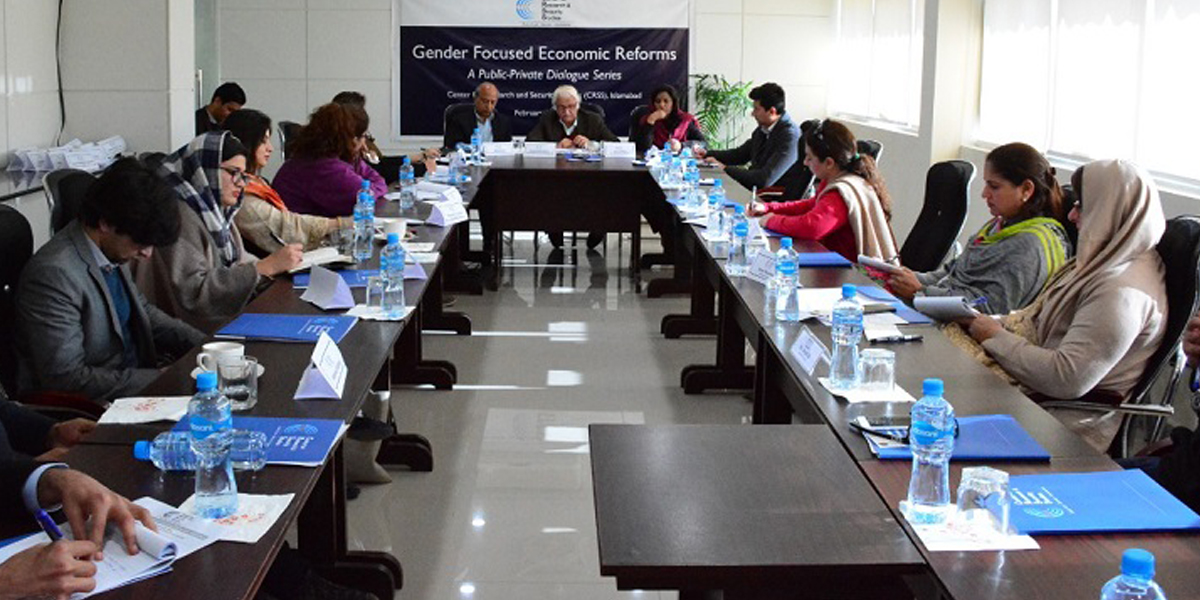The more you do, the more you achieve, the more you achieve, the more you understand what more needs to be done, says Farhatullah Babar, Secretary General, PPPP and Former Senator during the Public-Private Dialogue on Gender Focused Economic Reforms, held at Center for Research and Security Studies (CRSS), Islamabad on February 22, 2019. The event was also participated by Dr. Nafisa Shah, MNA and several private sector representatives along with the representatives of the State Bank, SMEDA and civil society.
He said that the womens’ economic participation issue is inseparable from their other issues. We need to have a very clear idea as to what inhibits womens’ economic empowerment. We all know that women are subjected to violence, discrimination of identity, and inequality before law and it’s a proven fact that a large number of women are disenfranchised. The society refuses to give them their due right to work; discouraging them to collectively voice their concerns.
There is no recognition of their domestic work and their economic contribution in the informal sector. Even if recognized, they face issues like non-payment and under-payment. In 1950, the provisions of ‘equal pay for women’ and ‘anti-torture law’ were enshrined in the first annexe that would pave a path to the drafting of the Constitution in 1956, however, the 1956 constitution and following were silent on the subject matter.
The informal sector – comprising nearly 8.5 million workers with a significant woman percentage – needs to be recognized and regulated. Only by identifying road blocks, can women be economically empowered. Pakistan is an overly legislated country; it just faces severe implementation challenges. The flawed and discriminatory criminal justice system along with women’s limited knowledge and access of and to their rights and legal processes respectively, adds fuel to fire.
The ILO convention 189 – though signed but not ratified – calls for recognition of womens’ domestic work. There should be a poverty alleviation program where women should be the primary beneficiaries for economic relief. The existing structures for the status of women including the provincial and federal commissions need to be strengthened.
The sustainable development goals (SDGs) whose significant part is women related, need to be implemented effectively. Also we should condition NFC Awards with the SDGs implementation for the provinces. A national register of shame and horror; a catalogue on crimes against women need to be documented where a special prosecutor should be assigned for gender related crimes.
Dr. Nafisa Shah said that the recent gender gap ranking of Pakistan is quite alarming. The womens’ poor economic participation is one of the major reasons that contribute to Pakistan’s socio-economic and political issues. The women are explicitly excluded from the economic sector. However, it must be realized that the economic exclusion of women is as bad as the discrimination against women.
Womens’ economic inclusion requires an all-encompassing approach with as basic measures as starting with the queries like how many women are National Identity Card holders, have a formal financial status, financial literacy, access to credit and formal banking. But unfortunately, the formal banking is a ‘no-go’ area for a majority of rural women.
The microfinancing facilities offered to women entrepreneurs should be cognizant of their needs such as low-interest loans facilities and minimum capital requirement. The higher interest rates and inadequate microfinancing equate to financial discrimination. Pakistan’s hardworking, enterprising and capable women; especially in the rural areas need help and guidance in understanding the physical market places as well as larger import and export markets. The is a dire lack of research with regard to women enterprises and their areas of operation to create synergies critical to networking, growth and development.
The empowerment of women may not only come through one comprehensive law but through several laws relevant to their different needs. The economic rights cannot be separated from other rights. The social, political and legal rights are as important as economic rights. Given the cultural and tradition realities in Pakistan, we need to push for a comprehensive legal rights structure for women to allow them to thrive independently. Discrimination is the worst thing one can imagine; especially the discrimination against women in economic domain cannot accepted in the modern times.
The participating private sector leaders – mostly females – were of the view that women in the ley decision making roles need to be increased as a measure of their empowerment. There should be a mechanism for intra-women-chambers integration, increased access to market and more advocacy on the issues that concern private sector the most. The digital literacy is need of the hour for aspiring and current women entrepreneurs.
Ms. Masooma Sibtain, former Vice President, Federation of Pakistan Chambers of Commerce & Industry (FPCCI) shared the priority intervention areas identified in the women national business agenda (WNBA) – a policy proposal on gender focused economic reforms presented from the platform of FPCCI. She called for the robust feedback of private sector on the potential avenues for enhanced economic participation of women given the impending SME policy and Strategic Trade Policy Framework (STPF) and their importance to reduce the alarming gender gap and add to the Pakistan’s GDP by about 30%.
The participants concurred that a whole-of-society approach is needed to bring about change.



